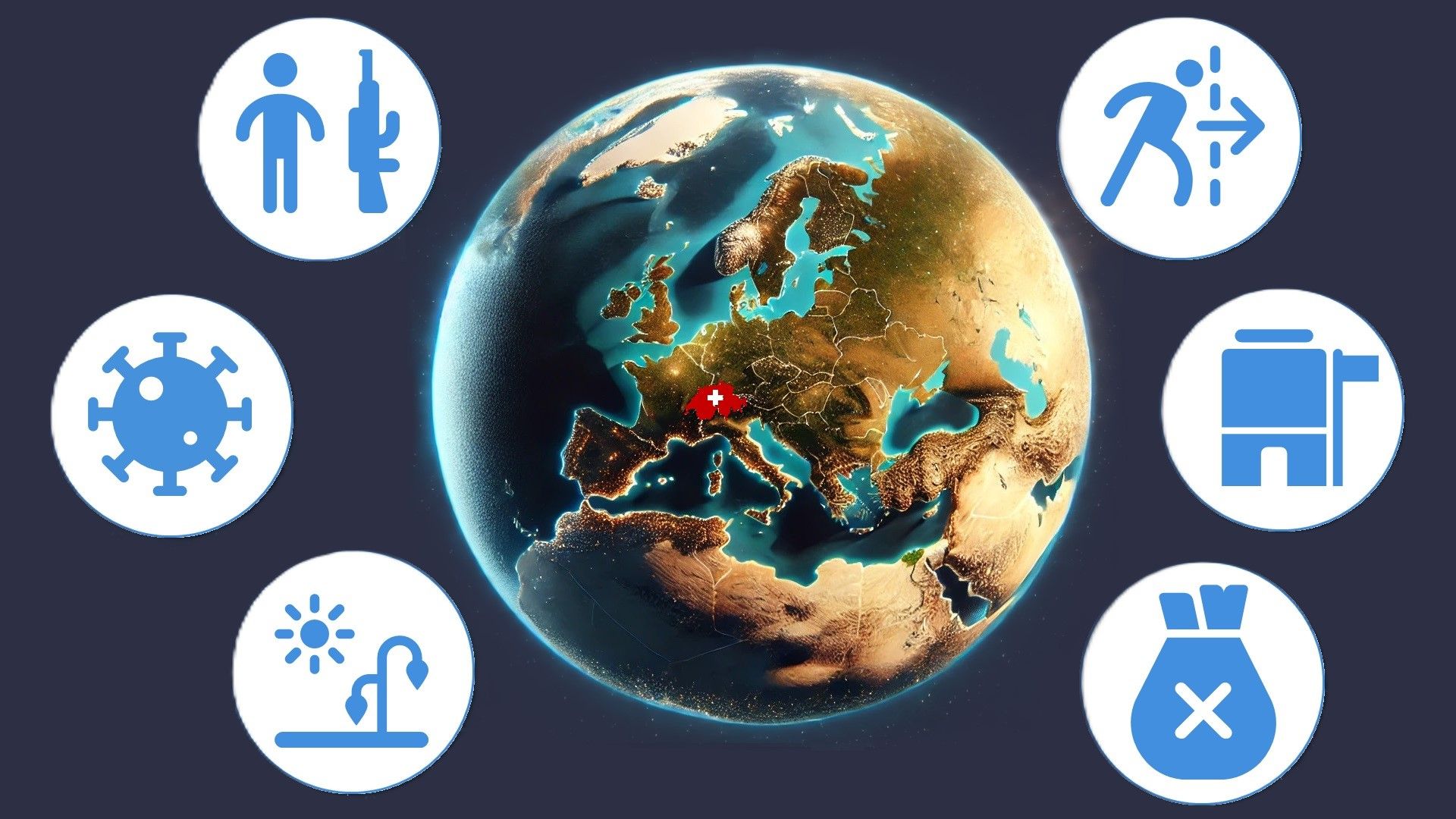International co-operation as integral part of Swiss security policy
Switzerland's security depends on solving global problems. The country therefore has a comprehensive approach to security as extending beyond military aspects in the international arena. It uses international cooperation to reduce its security risks in areas such as climate change and extreme weather, economic networking, global health, extremism, migration and forced displacement, and multilateralism.

The relevance of common development goals to security is made explicit in the 2030 Agenda adopted by UN member states: «Sustainable development cannot be realised without peace and security; and peace and security will be at risk without sustainable development.» [Resolution adopted by the UN General Assembly (2015)]
The stalling, or even reversal, of progress on sustainable development – in areas such as poverty, hunger, education, economic growth, climate and biodiversity, and peace – is a major cause of the deteriorating global security situation. Uncertainty and instability in turn hinder sustainable development. This negative interaction directly affects Swiss security in the medium and long term.
In recent decades, considerable progress has been made in sustainable development, particularly on poverty, health and education. This progress is now at risk, with the international community on track to achieve only 16% of the Sustainable Development Goals. To make matters worse, progress varies greatly and the gap between the poorest and richer countries is widening [Sustainable Development Report 2024]. The main reasons for this are the growing vulnerability of the poorest countries to multiple crises, such as climate change, the COVID-19 pandemic and the increase in violent conflicts.
Risks to security – and what Switzerland is doing about them
These developments have a direct impact on the global security situation and Switzerland's security. Through international cooperation (IC) – consisting of development cooperation, humanitarian aid and peacebuilding – Switzerland has instruments at its disposal to minimise risk in various areas:
Climate change and extreme weather
Climate change is increasing the frequency and intensity of extreme weather events such as floods, storms and droughts. The security aspect of climate change is also underscored in the Foreign Policy Strategy. According to MeteoSwiss, the Swiss climate has already changed significantly, and there is a threat of more extreme weather with drier summers, heavier precipitation, more hot days and winters with little snow. Mountain regions are likely to face additional risks such as rockfalls and debris flows, as well as loss of biodiversity. In addition to the direct impacts, Switzerland may also be affected by instability caused by climate change, which significantly increases the potential for global conflict [Hisang, Burke & Miguel (2013)].
Economic interdependence
Economic and security issues are becoming increasingly intertwined. As a country with few natural resources and a strong focus on exports [Swiss exports accounted for around 77% of GDP in the record year 2022 (World Bank, 2024) and imports for around 63% (World Bank, 2024)], Switzerland is dependent on international partnerships, a rules-based international order and functioning supply chains. Setbacks in sustainable development are also harmful to the Swiss economy, owing for example to significant supply chain bottlenecks [Economiesuisse (2021), World Economic Forum (2024), Credit Suisse (2022)].
Global health
Switzerland's Foreign Policy Strategy recognises a link between global health and international security. Global health crises such as the COVID-19 pandemic are a good example of this. Scientists argue that preventing future pandemics depends not only on better international coordination but also, to a large degree, on the resilience of healthcare within countries. [See for example Arush et al. (2022), Assefa et al. (2020)]
Extremism
A lack of prospects is the main driver of radicalisation and violent extremism, which also have repercussions for Switzerland. The academic literature identifies the following main causes: discrimination against social groups, state repression, poverty, unemployment and lack of education. [Vergani, Iqbal, Ilbahar & Barton (2018)]
Migration and forced displacement
Forced displacement can often be a consequence of the failure to achieve the above goals. On the other hand, any form of migration can become a driver of innovation and economic growth and generate remittances that support poorer countries. Involuntary migration in particular can make the people affected physically and mentally vulnerable and drive them into poverty. [Adger, W Neil et al. (2019)]
Multilateralism
Switzerland favours an effective and targeted multilateral approach to global challenges. It advocates a rules-based world order, on which it depends as a small country. The system of international organisations based in Geneva contributes significantly to this. This system is also directly responsible for around 1% of Swiss GDP [Étude sur l'impact du secteur international à Genève (2024)] and indirectly enhances Switzerland's good reputation and the esteem in which it is held.
Switzerland's security is multifaceted and heavily influenced by international developments. International cooperation provides it with effective and complementary instruments that have contributed to the major progress made in recent decades, but which is now under threat. This progress is relevant to safety.
Contact
Eichenweg 5
3003 Bern

